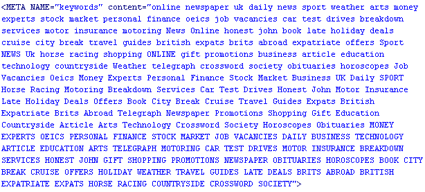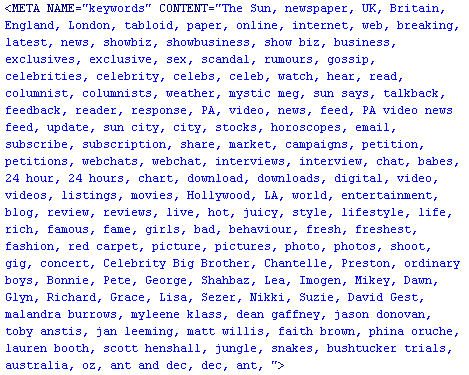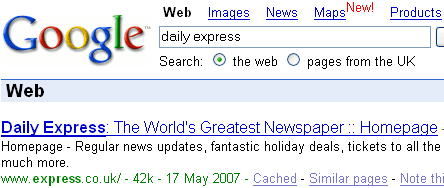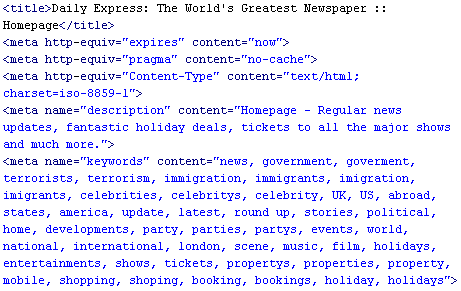Newspapers 2.0: What metadata can tell you about a newspaper
In the late 1990s metadata was the buzz word in search optimisation circles. By tweaking your <meta> description and keywords tags, you could manipulate the way your page was listed by the search engines of the time.
The trick was basically to stuff the meta tags with as many search terms you could think of, and hope the less sophisticated retrieval techniques of the time pulled your pages up for those phrases. [1]
Once Google's PageRank algorithm came along, the power of the meta keywords tag and the other elements in the <head> of an HTML document was diminished.
However, they do still play a part in how sites are presented to the user. The content of the <title> tag appears in the user's browser.
Search engines still sometimes use snippets from the description tag in their listings.

And the keywords tag?
Erm...
Well, actually, you can pretty much forget that one - unless you are using it for some kind of internal or site search engine.
The newspapers I've been reviewing as part of my "Newspapers 2.0" series have a varied approach to their homepage metadata.
The facts, and nothing but the facts
The Daily Mail goes for the simple approach - the homepage is titled "Daily Mail, Mail on Sunday, news, sport, showbiz, health, femail, comment | the Daily Mail", and the site is described as a way to "Access the Daily Mail and The Mail on Sunday online 24 hours a day"
The Times opts to put the type of content you'll find before their brand in their slightly oddly punctuated <title> tag - "World, UK and Business news and comment from The Times and The Sunday Times -TimesOnline".
For a description they have the repetition of "World, UK and Business news and comment from The Times and The Sunday Times"
The Telegraph is short, sweet and to the point - well, mostly.
The homepage is simply titled "Telegraph newspaper online" and the description reads "Daily News from The Daily Telegraph contains UK and world daily news, sports, weather, business, money, and stock market news, classified adverts and jobs in the UK."
The Telegraph is a little guilty of stuffing the keywords tag however.

Just nothing
Several newspapers don't make much of an effort at all.
The Mirror, for example, uses their URL as their title, has a blank keywords tag, and the cryptic 'm3' as their site description.

This backfires for them on MSN Search, which quotes back that cryptic 'm3' description to the user.

The Independent also goes for the minimalist approach to metadata. Their front page declares the page to be the "Independent Online Edition > Home", but their description and keywords tags simply say "home"
The Guardian's recently re-designed homepage follows suit - with a simple re-iteration of whereabouts the user is on the paper's network of sites. This serves as both the description and keywords for the new homepage.

Getting to the heart of the matter
Sometimes though, a site's metadata can be a gateway to the soul of an organisation, which seems to be the case with two of the newspapers I have been looking at over the last few weeks.
Like The Telegraph, The Sun is guilty of stuffing their keywords tag. The Sun's choice of keywords is more time-sensitive though, with specific references to individual series of TV shows "Celebrity Big Brother" and "I'm A Celebrity...Get Me Out Of Here" thrown in.

One disadvantage of this time-sensitive approach is that if you don't keep your keywords updated, it looks like a pointless exercise. Even an ex-pat like me knows that the absence of Shilpa, Jade, and S Club Jo from the keywords list means it hasn't been updated since before the last series of Celebrity BB.
Since the keywords tag has a negligible effect on search engines these days, isn't being kept up to date, and is just eating up useless bandwidth every time the page is served, why bother?
The way The Sun uses their <title> tag seems to set very clearly what they believe is their news agenda.
None of the newspapers I have looked at have 'crime' as a primary navigational element, but The Sun clearly sees it as a selling point for their web site. Listed behind two location descriptions, it comes before politics, and is the foremost topic of news in the paper's online title.
This usage in the <title> tag is reflected in the way Google lists The Sun's site, as is the HTML claim by the Daily Express to be "The World's Greatest Newspaper"

The description tag on the Express homepage emphasises the e-commerce opportunities on the site more than news delivery - "Homepage - Regular news updates, fantastic holiday deals, tickets to all the major shows and much more."
However, it is The Daily Express meta keyword tag which surely gives a real glimpse into the soul of working for the paper.
At some point, someone sat down and decided that these were the keywords people looking for the Express were most likely to type in, and the keywords that the newspaper most wanted to be found for.
The first nine keywords listed are:
news, government, goverment, terrorists, terrorism, immigration, immigrants, imigration, imigrants

It isn't entirely clear to me, however, how Diana failed to make the list...
[1] I mostly recall this effect because whatever you searched for, you got back a page of what looked liked relevant results, and they all linked through to pages with pictures of Pamela Anderson with her clothes off. [Return to article]
The Express keywords are a brilliant find. Yet another indication that the Express has moved beyond parody!